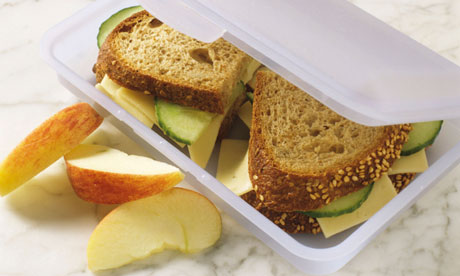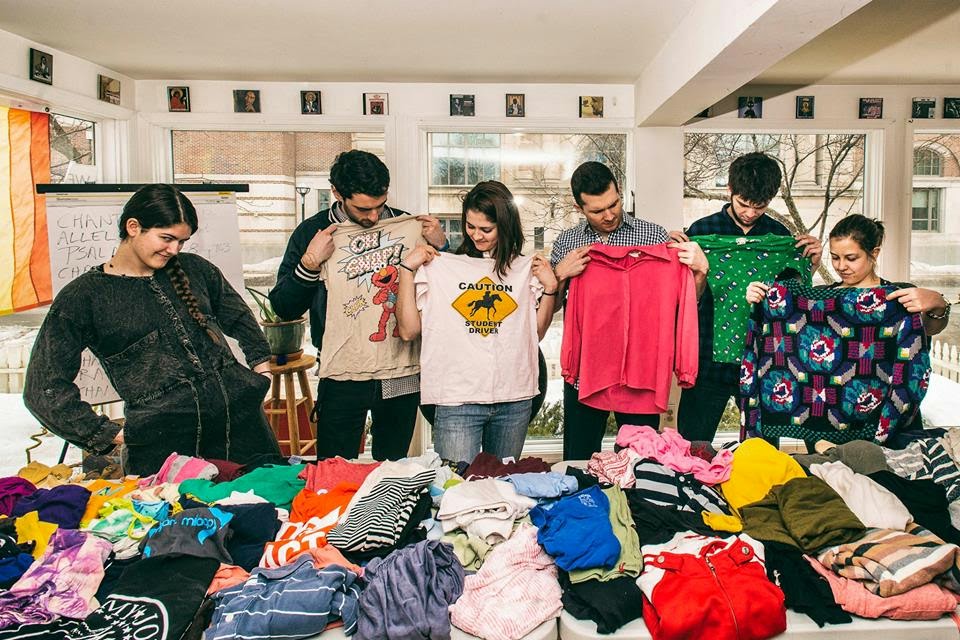AA is one of the greatest places to eat in the entire world. Our food is so good that Buzzfeed even wrote an article about it. World famous eateries line our streets, like Zingerman's, Angelo's, and Tíos (which was featured on Man vs. Food for their Mount Nacheesmo). But we aren't lacking in America's beloved fast food restaurants, either. Fast food, with its high-profits-at-any-cost-to-society atmosphere, however, is not very eco-friendly. This post features a go-to guide on our city's fast food restaurants and their varying levels of (un)sustainability.
1. Wendy’s
 |
| This photo was retrieved here. |
The first stop on our tour is Wendy's, located in the basement of the Union. Since we are the Waste Reduction and Recycling Office, this post will focus mostly on each company's packaging and recycling programs.
Wendy's, unlike some others on this list, does include a page on their website for 'Environmental Sustainability,' but it's so vague that it's practically useless.They make statements like,"We continually strive to be good stewards of the environment by working closely with our vendors, to purchase products and services with a view toward energy efficiency and a low environmental impact." What are the more energy-efficient products? What does 'work closely' mean?
 |
| This photo was retrieved from the 'Environmental Sustainability' page on Wendy's website. |
A vague "many" of their restaurants recycle corrugated cardboard boxes and used cooking oil, so that's something. Also, Wendy's recently started using tray liners made from 100% recycled materials, which they claim represents saving 21,250 trees a year. See the image to the right for more fun facts. Also, see the bottom of this blog post for an assessment of Wendy's sustainability by Tree Hugger.
2. Subway
 |
| This photo was retrieved here. |
Our next stop is right around the corner from Wendy's. Literally around the corner in the Union basement. Subway seems to be making more of an effort to include recycled materials in all of their products, as well as to be more transparent about it. Their towel and tissue products are made with 100% recycled material and are printed using soy or water-based inks. Subway is also making significant strides with waste reduction. They are reducing waste by removing the paper interleaf between their cheese slices, which has removed 450,000 pounds of paper from their waste stream. It's a bit harder for them since anyone can be a franchisee, but they do have recycling and composting bins available for any interested franchisee. The recycling and composting program isn't necessarily being enforced, though. However, according to Tree Hugger's analysis below, Subway is making considerably more effort than most other fast food chains.
3. Noodles & Co.
 |
| This photo was retrieved here. |
Now let's move up State street to Noodles & Company. Well, this is embarrassing. For them, I mean. I can't find any information on them making a single sustainability initiative. While they do not appear to be making any sustainability initiatives directly, they are inadvertently reducing waste by serving their dine-in meals in china dishes rather than disposable packaging.
4. Five Guys
 |
| This photo was retrieved here. |
Cross the street after Noodles, and we've reached Five Guys. Similar to Noodles, it is my inference that Five Guys engages in a number of sustainable behaviors without explicitly trying to. For example, they only have coolers, no freezers, in their establishments. While they do this to sustain the delicious flavor in their patties, it is also more energy-efficient. In addition, their packaging is minimalist - an unbleached paper bag, some aluminum foil, and a paper cup will be your only waste from getting a burger and fries. They also process their own fries on site, cutting down on pollution from transport. However, they serve mainly beef, which is the least energy efficient form of meat - it takes thousands of gallons of water to raise a cow, not to mention the energy it takes to process the meat.
 |
| This photo was retrieved here. |
5. Potbelly
Cross the street to the corner of State and East Liberty and we're at Potbelly. Potbelly claims they recycle at 70% of their shops.The chain has an ongoing initiative to increase recycling; they're working with their landlords and waste collectors to expand their recycling program and decrease waste. Whenever possible they reuse a building’s existing wood floors, brick
walls, ceilings and other historical elements. It’s an acknowledgement of the building’s history, but it’s also less
wasteful and therefore better for the environment.
6. Chipotle
 |
| This photo was retrieved here. |
Chipotle is right across State Street from Potbelly. Chipotle has an in-store recycling program that captures glass and plastic bottles from consumers and cardboard from the kitchen. Construction projects recycle roughly 95% of their waste through the creation of a construction waste management plan. They take measures like using 25% fly ash (a by-product of coal combustion) as a recycled material in their concrete. Chipotle also uses packaging materials that have minimal effect on the environment. Their burrito bowls are made from 93% recycled material (mostly recycled newspapers) this saves over 58,000 trees a year. Their aluminum lids are made of 95% recycled materials, including aluminum cans. By using 100%
recycled content in their napkins, the company saves over 22 million gallons of water
per year. They've reduced more than 140,000 pounds of chemical pesticide since 2005.
7. Panera
 |
| This photo was retrieved here. |
Head South and round the corner at North University and you'll find Panera. Panera, like Noodles & Company, uses real dishes, so this is a waste-reducing effort made on their part. According to Mother Nature Network, they've also promised to remove all artificial ingredients from their product by 2016.
8. Taco Bell
 |
| This photo was retrieved here. |
Keep heading down North University to the basement of the League, where you'll find Taco Bell. Taco Bell is owned by Yum! Brands, who have developed Sustainable Sourcing and Waste Recovery Principles for their restaurants. Sustainable Sourcing ensures that paper and paper-based packaging products aren't coming from illegal fiber sources. This also means they are going to prefer suppliers who provide certified wood fiber. They also hope to source fiber from the Sustainable Forestry Initiative. Yum! wants to increase the amount of recycled content in their packaging, but they say that limited availability of recycled fibers restricts their ability to do so. They spent 6 months in 2013 surveying their global suppliers, asking questions about recycled and certified fiber content and country of forest fiber origin. Next, their Waste Recovery Principles are active in both restaurants as well as corporate offices. Yum! is expanding recycling to all of our restaurants as recycling systems become available. They also work with cross-industry groups such as the Paper Recovery Alliance and Food Waste Reduction Alliance to further food waste recovery and recycling efforts.
Works Cited
"Environmental Sustainability." Home. Wendy's, n.d. Web. 11 June 2014.
"Environmental Leadership." Environmental Leadership. Subway, n.d. Web. 10 June 2014.
"Green Initiatives." Respect the Planet. Potbelly, n.d. Web. 11 June 2014.
"Chipotle: Restaurants." Chipotle: Restaurants. Chipotle, n.d. Web. 11 June 2014.
"Chipotle: Food With Integrity." Chipotle: Food With Integrity. Chipotle, n.d. Web. 09 June 2014.
"Sustainable Paper-Based Packaging." Goal. Yum! Brands, 2013. Web. 11 June 2014.
Chheng, Tommy. "Fast Food Companies Fall Short on Deforestation Commitments." TreeHugger. TreeHugger, 27 May 2014. Web. 11 June 2014.























































